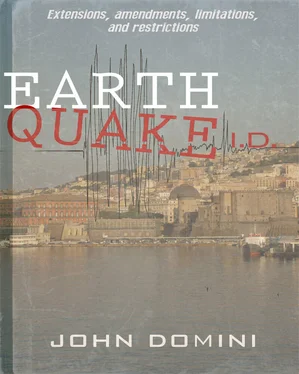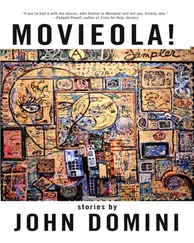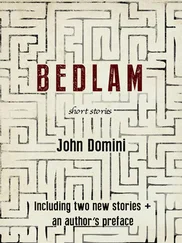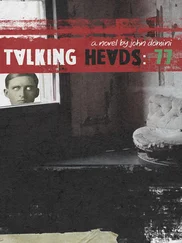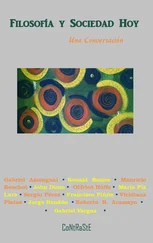BARBARA: The episodes are a temporary condition? You won’t always…
( PAUL plucks at pants-legs, pinching the crease ).
BARBARA: Sorry, Paul. You tell it. Your story.
PAUL: Well, come on. This can’t keep, keep h-happening the rest of my life. Even when it, when it d-does happen, you can feel the thing has like, it’s licked out its, its one and o-only tunnel. One soul, solo tunnel, one ten, tentacle. Then it’s done.
( BARBARA moves onscreen, beside the boy. Focus widens around them: a balcony over a piazza. He’s in a chair and she squats beside him, against railing .)
DR. DIPIO ( off-screen ): Si. Phenomenon is situational.
PAUL ( hands clasped but fingers extended, Italian ): You know what i-it feels like when, when something can’t last.
( BARBARA nods slowly .)
“Look at him,” the sailor-boy said, “like the camera isn’t even there. Do it do it do it. Superstar authenticity.”
Spare me, Hollywood. The editor was Neapolitan, born and raised not far from Barbara’s upscale palazzo, but he’d gotten a film degree from NYU and he’d asked the mother to call him Whitman. If you asked her, the way he darted between mouse and keyboard called to mind a dancer rather than a poet. A ballet dancer, nothing but muscle and bone. And every time he made a pirouette, the video became more interesting. Whitman created emphasis; he made Paul’s gesturing hands fill the screen.
As for the young man’s gayness, flaming, l’Americana couldn’t say she was surprised. Naples was famous for its queers, a sailors’ town. Even her father had told her a story about the local demi-monde — or part of a story. Dad had managed only a halting effort at sharing such stuff with his Barbie, sweet but halting. He’d done what he could to increase his daughter’s sophistication while, at the same time, striving to comprehend his own failed foray into love. But she hadn’t needed her Babo’s help. The drag queens of Naples actually rated mention in the guidebooks. An American could find a photo or two, since a number of the male hookers found the pictures good for business. The poses made Barbara think of her mother-in-law, her man-catching sashay.
Silky Kahlberg of course had known all about such creatures of the shadow. Once when he and Barbara had been away from the children, he’d pointed out a couple of the more flagrant cross-dressers. As if the mother could’ve missed them in the first place. Dr. DiPio however, forever needing the consolation of his Mr. Christopher, had surprised her. She would never have expected the old medico would know someone like Whitman. Nor would Barbara have thought that an editor of this young man’s rank and accomplishment would bother with her material, the roughest kind of point-&-shoot. In the States only someone on the fringes of the business, say a student strapped for cash, would’ve accepted such an assignment. The keyboard Baryshnikov beside her, on the other hand, boasted openly about a short he’d just completed. It had been picked up for an anthology of “the Naples new wave,” he announced, and what’s more, his first full-length feature would be rebroadcast next week on cable-access. You could buy that earlier movie off the web too, Whitman told her. A five-minute trailer was available without subscription. Just watching the man sent Barbara into another dizzying carom between believing she had a handle on this city and thinking she knew nothing.
Whitman also insisted they speak English. “I need the practice,” he said.
The man worked Christopher Street into the conversation, “Christopher east,” as if the distinction mattered. What Barbara was finding significant, however, was something close by — the man’s hair. Above his nipple-notched top, Whitman affected the look of a young King David, with luxuriant black curls that hung to his shoulders. As he sat working the computer, in that shifting and indirect light, he called to mind the late Lieutenant-Major. Barbara couldn’t help noticing: Silky had worn his the same length. He’d tossed it back with the same vanity, the same flair, and with an almost identical twist of the neck. Now what did that mean?
PAUL: S-Situational, yeah, that’s the way it, it comes. Like, so situational. Something, something hollows ow, out the tunnel, and then it a-all, it all whacks you a-at once. A-all at once, it’s there in front and, and it’s there in back, and if there a-are words, they’re a-all at once. It’s, it’s in your fingers, or it’s, it’s right at your fingers, you, you can just reach it, and, and, it’s between your, your legs too, it’s buh, buh…
BARBARA: That’s okay, Paulie. I understand.
DIPIO ( off-screen ): But why the tongue, please? Why the tongue?
Whitman’s hands kept accelerating: first ballet, then jazz. To watch him go, snipping out the overlap in the two interviews Barbara had brought him, you’d think anyone could do this. Anyone could make it interesting. But the young pro had an idea behind every cut and paste, and he shared a lot of his thinking, while also getting off snide remarks about “movies that should go on a diet.” Barb was left feeling like a hayseed, a dumbo American, because she’d never heard of most of the films he was complaining about.
But then, she’d asked for this. Naturally, when she’d told Chris and John Junior she needed the equipment for a couple of afternoons — she too needed to make a document, a picture about Paul — once again the teenagers had sworn up and down that their younger brother was a big part of their own project.
“Hey. This isn’t just another teen movie.”
“Mom like, think of Casablanca . ‘The problems of three little people don’t amount to a hill of beans in this world.’”
But Barb had never cared for that movie, to her it played as if the whole point of the Second World War had been to make Humphrey Bogart’s love life more interesting, and she’d been under no illusions about what her two oldest would do with raw footage of the middle child talking. They’d tear it apart. They’d warp their younger brother’s hard-won articulations in whatever way might serve their own purposes. What could she expect, from teenage boys? If Barbara let them handle the interviews, or if she gave them the interviews unedited, Paul would get lost in translation. Once more he’d go neglected, in the name of some greater, foggier good.
PAUL ( squinting off ): Their tongue, wow. But it’s, it’s like I say, this never hap, happens in words, or, or never words lined up a-and getting somewhere. It’s never like a, it never adds up to a, a, a story.
( BARBARA nods, upright, propped on railing )
PAUL: The tongue is like the tentacle. Wh-when that feeling is row, is rolling, it comes, it comes o-out at the tongue, ( eyes shift to BARBARA )
BARBARA: This is what we’re here for, Paulie. It’s nothing bad or crazy.
PAUL: Can’t, can’t you understand, that’s where I catch it? The tongue. It’s, it’s the place where I, I get hold of the trouble. Can’t you, why can’t you j-just feel it?
“You know after I edit,” Whitman said, “I can download straight to the web.”
He made an acrobat of the cursor, swinging it from icon to icon along the top of the screen. He assured Barb she’d leave here with the edited file in her scan-disk stick, and a DVD as well if she wanted. “But streaming video, that’s instant gratification.”
The mother didn’t respond, thinking differently. What her youngest boy had felt, during his episodes, no longer sounded so strange. This time around the mother noticed how his descriptions fit the testimonies that had turned up in the reading she’d done, ten days ago now. She saw what the boy had to say carpentered into a single fifteen- or twenty-minute burst, stinging but confined, and as she watched, Barbara understood better than before how Mr. Paul had been living with an invisible talent like her own, the talent to link up, now and again, with the Universal Horsepower. She understood that the absence of healthier exercise for the boy’s spirit-muscle had forced up these recent eruptions; the miracles had worked as a safety valve, an overflow. And while Barb got the picture, all at once like this, she suffered its wallop, sure. But then the picture was over — the cry from Paul’s heart shrank into an icon on the monitor. Soon enough that icon would disappear inside another, and neither would appear larger than the tip of her pinkie. Likewise the entire family’s transoceanic event, in which an untreatable sickness on one side of the Atlantic had turned into an unknowable medicine on the other, would be reduced to a moment’s chatter between satellites.
Читать дальше
